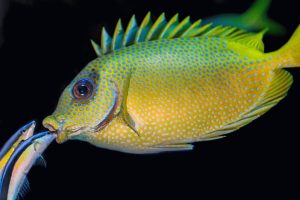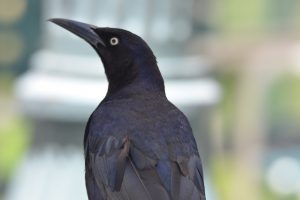Cleaner fish more self-aware than thought

A study published in February calls into question the widely held belief that fish are stupid, by showing that they can recognise their own reflection.


A study published in February calls into question the widely held belief that fish are stupid, by showing that they can recognise their own reflection.

Colour exists on a continuum, and yet human language is surprisingly consistent in how it categorises colours.
Previous studies have found that infants at the age of four months old can distinguish the basic colour categories common to many languages (e.g. blue, red, yellow), suggesting there is a biological basis to our color categories. However, these studies have focussed on just a few color categories that are important in English.

Great-tailed grackles are very flexible, quickly learning to associate new cues with food, but new research suggests this doesn’t help them innovate to solve new problems.
Brains rather than braun may have guided our ancestors out of Africa, but new research suggests primates’ big brains are no longer the assets they once were.
A study published in the journal Evolution reports that larger brains are directly related to an increased risk of extinction in modern primates. Researchers led by Alejandro Gonzalez-Voyer at Doñana Biological Station in Spain, compared published data on 474 species of mammal, with their IUCN Redlist categorisations, to find out how different biological traits influence extinction risk. The team found that larger brains tend to be associated with a longer gestation period, longer weaning period and smaller litter sizes, all of which indirectly increase extinction risk.
We like to think that our more complex emotions are uniquely human, although researchers continually thwarting that belief with science. This week, another of our emotions came under threat – regret. Nobody has ever demonstrated regret in another non-human animal. Until now. A study released this month in Nature claims to have found evidence that rats are capable of feeling regret, a complex emotion distinct from mere disappointment.
Disappointment is when we recognise that we didn’t get as much as we expected, whereas to regret is to recognise that our actions are the reason behind this – that an alternative action, a different decision, would have produced a better outcome. In this study, researchers forced rats to choose between waiting for a particular reward, or moving onto the next reward that may come with an even longer wait. This is exactly the type of situation we might expect rats to feel regretful about, but are they smart enough to feel such a complex emotion?
One of the most distinctive characteristics of Homo sapiens is our exceptionally large brain, and enhanced cognitive capabilities. In fact, large brains, measured by the encephalisation quotient (EQ), are a characteristic of primates in general, and brain size and complexity has been increasing in the primate lineage for nearly 70 million years. However, this trend is particularly noticeable in the human lineage, and the last 3 million years of hominid evolution have seen the most pronounced increases in encephalisation, with a tripling in brain size. Such a rapid increase in size is extraordinary, especially for an organ so complex. Some areas of the brain have expanded disproportionately, such as the cerebral cortex, which has increased in size by 3 orders of magnitude since our divergence from Chimpanzees. The cerebral cortex accounts for around 85% of total brain volume in humans, and is responsible for complex mental functions.